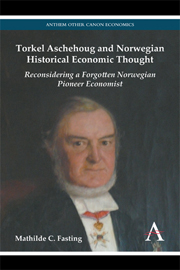 Torkel Aschehoug and Norwegian Historical Economic Thought
Torkel Aschehoug and Norwegian Historical Economic Thought Book contents
- Frontmatter
- Contents
- Acknowledgements
- Chapter 1 Introduction
- Chapter 2 Biography
- Chapter 3 Norwegian Economic and Political Context in the Nineteenth Century
- Chapter 4 Norwegian Economic Thought and Method
- Chapter 5 Development of the Economic Thought of Aschehoug: Statsøkonomisk Forening and the Socialøkonomik Project
- Chapter 6 The German Historical School: Similarities, Influences and Discrepancies
- Chapter 7 Alfred Marshall: Aschehoug and the Adoption of Marginal Theory
- Chapter 8 The French Influence: Adopting Say and Refuting Socialism
- Chapter 9 Views of Labour in the Work of Aschehoug
- Chapter 10 The Entrepreneur: The Fourth Production Factor
- Chapter 11 Trade and Customs Debates from 1840 to 1906
- Chapter 12 The Theory of Economic Crises
- Chapter 13 The Legacy of Aschehoug: Concluding Remarks
- Appendix A Other Norwegian Turn-of-the-Century Economists
- Appendix B Drafts for Socialøkonomik
- Appendix C Detailed Contents of Socialøkonomik (First Editions from 1903 to 1908)
- Notes
- Literature
- Index
Chapter 6 - The German Historical School: Similarities, Influences and Discrepancies
Published online by Cambridge University Press: 05 March 2014
- Frontmatter
- Contents
- Acknowledgements
- Chapter 1 Introduction
- Chapter 2 Biography
- Chapter 3 Norwegian Economic and Political Context in the Nineteenth Century
- Chapter 4 Norwegian Economic Thought and Method
- Chapter 5 Development of the Economic Thought of Aschehoug: Statsøkonomisk Forening and the Socialøkonomik Project
- Chapter 6 The German Historical School: Similarities, Influences and Discrepancies
- Chapter 7 Alfred Marshall: Aschehoug and the Adoption of Marginal Theory
- Chapter 8 The French Influence: Adopting Say and Refuting Socialism
- Chapter 9 Views of Labour in the Work of Aschehoug
- Chapter 10 The Entrepreneur: The Fourth Production Factor
- Chapter 11 Trade and Customs Debates from 1840 to 1906
- Chapter 12 The Theory of Economic Crises
- Chapter 13 The Legacy of Aschehoug: Concluding Remarks
- Appendix A Other Norwegian Turn-of-the-Century Economists
- Appendix B Drafts for Socialøkonomik
- Appendix C Detailed Contents of Socialøkonomik (First Editions from 1903 to 1908)
- Notes
- Literature
- Index
Summary
A short presentation of the German historical school will be given, emphasizing the issues that are relevant for the parallel development in Norway. Thus, it is not a complete analysis of the German historical school or the views of Schmoller, but rather a summary of the relevant topics for Aschehoug and the foundation and development of the Statsøkonomisk forening as a vehicle for the progression and discussion of economic thought.
The Norwegian economists followed the development of German economic theory closely. A small analysis of Statsøkonomisk Tidsskrift shows that the annual presentation of new literature, debates, journals and books contained almost everything that was published in Germany. Aschehoug quotes extensively from German authors, he comments on them and was clearly updated on German economic thought. But as the late Norwegian economist Amundsen says, ‘The political situation in Norway was closer to that in Britain than in the German states, and there was no substantial acceptance of the historical school among the Norwegian economists in the nineteenth century.’ This may be true when it came to the political situation, but it will be argued here that Amundsen errs in his comments about the influence of the German historical school theoretically. Why the Germans ended up emphasizing historical thought can be seen scientifically as a reaction towards what were perceived as the errors of the early classical school. In this respect the work of the school must be valued.
- Type
- Chapter
- Information
- Torkel Aschehoug and Norwegian Historical Economic ThoughtReconsidering a Forgotten Norwegian Pioneer Economist, pp. 79 - 102Publisher: Anthem PressPrint publication year: 2013
